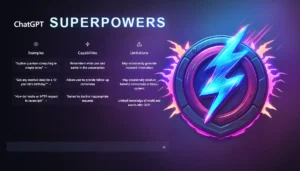It’s no secret that artificial intelligence (AI) is becoming increasingly prevalent in our daily lives. From self-driving cars to virtual assistants, it seems that there’s no end to the ways in which AI is changing the way we live and work. But one AI, in particular, has been causing much concern lately: ChatGPT by OpenAI
ChatGPT’s Impact on Students
One of the main groups of people using ChatGPT is students. The AI has been able to generate entire assignments and essays, making it easy for students to complete their coursework quickly and efficiently. While this may seem like a godsend for busy students, it has some educators worried about the impact it may have on their future.
On the one hand, using ChatGPT to complete assignments could be seen as cheating, as the student is not doing the work themselves. This could lead to a lack of critical thinking and problem-solving skills, which are crucial for success in the workforce. On the other hand, some argue that ChatGPT simply makes it easier for students to complete their coursework, freeing up time for other activities like internships and extracurriculars.
The Fear of Job Loss
Another group that has expressed concern about ChatGPT is software developers and copywriters. With the AI’s ability to write entire documents and even code, there is the fear that these jobs may become obsolete as more and more companies turn to AI for their writing and coding needs.
For example, AI algorithms can quickly analyze large amounts of data and identify patterns that may be difficult for a human to spot. This could lead to the automation of certain tasks, such as data analysis and content creation, which could potentially put jobs at risk.
Another concern is the lack of transparency in the decision-making process of AI systems. While human workers are accountable for their actions, it can be difficult to understand the reasoning behind the decisions made by AI algorithms. This lack of transparency could lead to a lack of trust in the technology and may make it difficult for human workers to effectively collaborate with AI systems.
It’s important for companies to consider the impact that AI may have on their workforce and to find ways to mitigate any negative effects. This could include providing training and support for workers to adapt to new technologies and implementing policies to ensure that human workers are involved in the decision-making process and have a say in how AI is used in their work. For while it may take over some of the more repetitious tasks, it is still important for human workers to be involved in the decision-making process and to provide oversight. In fact, the use of AI could potentially make these jobs easier, as it can handle the more tedious tasks while human workers focus on more creative and complex projects.
The Future of AI
It’s natural to be worried about the impact that AI may have on our lives and our jobs. But it’s important to remember that AI is not here to completely replace us. While it may change the way we work, it can also make our jobs easier and more efficient. The key is to embrace the changes that AI brings and to adapt to the new technologies as they emerge. By doing so, we can ensure that we are prepared for the future and ready to take on the challenges that it may bring.




